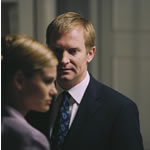The Inheritance (Per Fly)
American’s have often been accused of living a motto of “live to work” versus the “work to live” lifestyle we see Europeans enjoying, and might I add, with a bit of envy as our weekends turn into workends. The thought of taking eight weeks of vacation is unheard of as is leaving for the month of August on holiday.
But these are the workers we’re talking about.
“The Inheritance” brings us closer to the reality that the struggle between home and work is not saved for the capitalists in the U.S. when it comes to those that run their corporations. This movie by director Per Fly is actually part two in a film trilogy that spotlights the three social classes in Denmark: lower, middle and upper. Having not seen the previous award winning debut from Fly, “The Bench,” it is said that each movie stands on its own, which serves to be true since there are not any signs of previous plot line connections that left me wondering.
This time around the story surrounds the family corporation, the sacrifice of a son’s marriage and personal life for the good of the company, and how his choices cause him both personal misery and financial success. It was very interesting to see how similar business and human existence situations are not as different as I thought they were on the other side of the pond. These people are the upper echelon and powerful, but still have weak underbellies like the rest of us…at least some of the time.
This is not “edge of your seat” affair, but it was intriguing all the same. There were few surprises on the course of how the characters reacted to their situations, which would have added more spark to the story. But I believe the director was striving for what happens in real life, which is often not the case with most Hollywood productions.
Million Dollar Baby (2004, Clint Eastwood)
Clint Eastwood is double-Oscar-nominated for this film, as Best Actor and Best Director. He could’ve gotten a third nod, for Best Score, as well. Two-thirds of the way through, I didn’t really see why. And then–well, as another critic said, “If you think you know where this movie’s going, you don’t.”
It starts off typically enough, with an old boxing trainer (Eastwood) and his gym manager (Morgan Freeman) meeting a girl (Hilary Swank) who wants to be a boxer. There’s the clichéd scenes of the fighter running on the beach, the obligatory refusal by the rugged old man who doesn’t want to train a girl, and the rather heavy foreshadowing–Eastwood’s character is the best “cut man” in the business, meaning he can stop the bleeding on any wound so that his fighter can finish the job. The plucky girl from the trailer park who waits tables to pay the bills becomes a world-renowned fighter under the tutelage of the old master, and becomes like a daughter to him.
And that’s when the movie stops being predictable and starts being heartwrenching.
Morgan Freeman narrates the movie with lines that sound like a Tom Waits song and that voice that makes everything feel all right, and Eastwood makes the best of long shadows and bleak color schemes, playing off his own craggy face as well as the sharply defined muscles of his lead. But as she did in Boys Don’t Cry, Hilary Swank walks off with the movie, alternately wisecracking and heartbreaking, and her eyes alone will bring tears to your eyes.
For all the attention that it’s getting, this is a film that could easily fall off the edge of believable and into hokey territory in the hands of anyone less than the masters involved. But Clint Eastwood is an American treasure, Hilary Swank is one of if not the best actress in her generation, and if God is a man, he’s got the voice of Morgan Freeman. It’s to their credit that critics who’ve seen every cliché in the business, including me, are still calling this a brilliant film.



